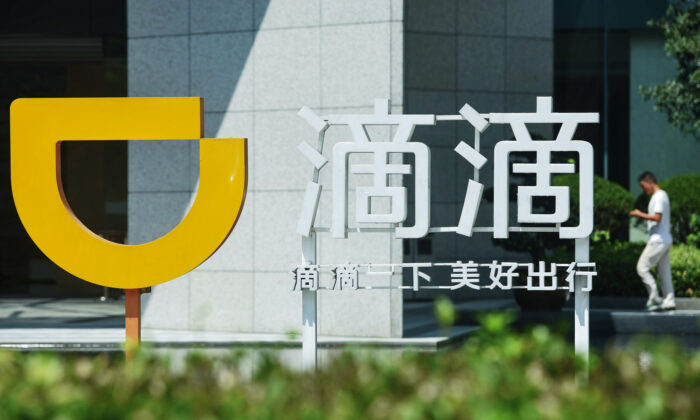By Sino Insider
On June 30, Didi Chuxing listed on the New York Stock Exchange and raised US$4.4 billion. The following day, its valuation exceeded US$78 billion.
Things went downhill fast. On July 2, the Cyberspace Administration of China (CAC) announced a cybersecurity review of the company. Two days later, Didi was removed from app stores, followed by another 25 apps linked with the ride-hailing firm on July 9. By July 12, Didi had lost about US$11 billion in market value from its peak on July 1.
Beijing’s swift crackdown on Didi shook the company’s stocks and that of other Chinese technology firms. The Nasdaq Golden Dragon China Index, which tracks US-listed Chinese stocks, fell 10.5 percent since July 2.
Many media outlets reported that Chinese regulators had discussions with Didi earlier in the year about data security concerns and indicated that the company should delay its initial public offering until they were addressed. However, Didi “offered assurances that Beijing had given it the green light” in New York, according to The Wall Street Journal. The Journal also reported that the company went ahead with its IPO because it “faced increasing investor pressure for a big payout”. Chinese regulators saw Didi’s move as a “deliberate act of deceit”, according to the South China Morning Post.
With Xi Jinping stressing in recent years that the Chinese Communist Party “rules everything”, Didi’s rushed and unapproved IPO seems reckless. Beijing’s crackdown, meanwhile, seems heavy-handed and risks alienating foreign investors. Yet when viewed from the perspective of CCP factional politics and Chinese technology company culture, both sides had in fact taken the natural course of action to protect their respective interests.
Foreigners may look at Alibaba’s maverick founder Jack Ma and presume that Chinese tech giants, just like their counterparts in Silicon Valley, made their buck through bold risk-taking and innovation. While innovation and risk-taking certainly are factors in the rapid growth and expansion of Alibaba, Tencent, and other tech giants, those companies would never have reached their current scale without business relations with and the backing of Communist Party elites. Established Chinese tech giants also benefited immensely from the loose government regulation and massive corruption endemic during the Jiang Zemin faction’s era of dominance from 1997 to 2012.
While Didi is a relatively new company (founded in 2012), there are those among its top executives, board members, and leading investors who are accustomed to the way things were done in the regime before Xi took office. Didi founder Cheng Wei was a former Alibaba executive, while Alibaba Chairman Daniel Zhang and Tencent’s president Martin Lau are on Didi’s board. Softbank, Didi’s largest shareholder, was one of Alibaba’s earliest big investors.
Conditioned to a lax regulatory environment and officials who frequently tolerated transgressions so long as money was made, established Chinese tech giants, their executives, and their alumni would likely believe that they can afford to play fast and loose with official “guidances”. After all, Chinese tech companies, some of which are “too big to fail”, contribute vastly to the Chinese economy and employment, and enjoy powerful political connections. This mindset likely swayed Jack Ma into believing that he could talk his way out of having to suspend Ant Group’s listing, and convinced Didi to push ahead with its US IPO without a clear mandate from Beijing.
Didi and Ant Group were mistaken to presume that Xi would let a slight to his and the Party’s authority go unpunished. Mainland companies, much like foreign firms in China, appear to be struggling to comprehend that the political rules of the game in the PRC have changed drastically under Xi, despite an anti-corruption campaign that has touched over 4 million Chinese officials and even led to the execution of the former boss of a state-owned enterprise this January.
But not all of these “mistakes” can be chalked up to ignorance. Some of Didi’s mainland investors and board members are linked with the influential Jiang Zemin faction that rivals the Xi camp. For instance, Didi board member Chen Zhiyi is from Boyu Capital, the private equity firm of Jiang Zemin’s grandson Alvin Jiang. Boyu Capital was instrumental in helping Alibaba with its US IPO in 2014, and Alibaba’s Daniel Zhang is also a Didi board member. Meanwhile, nearly 20 of Didi’s investors since 2015 were state-owned enterprises, including CITIC Capital. And back in 2015, Liu Lefei, the son of then-Politburo Standing Committee member Liu Yunshan, was chairman and CEO of CITIC Private Equity Fund. Liu Yunshan is a prominent Jiang faction lieutenant.
Xi’s factional rivals and Party interest groups have ample reason to pressure Didi to rush its US listing. As with the Ant Group IPO, the CCP elite are looking for ways to cash out as Xi tightens the regulatory environment. Had Didi waited another two months, it may have lost the listing opportunity altogether.
In May, PRC regulators announced a data security law restricting private sector firms from sending information overseas would be promulgated starting Sept 1. The law also gives Beijing more authority to extract data from those companies. The Party’s preoccupation with the CCP centennial celebration on July 1, however, allowed Didi a chance to sneak its listing through.
Didi’s political backers could also be betting that Xi Jinping would refrain from going too tough on the company after the IPO so as not to scandalise the Party on its hundredth anniversary. They were wrong on this count as Xi went after Didi in the CCP’s characteristically heavy-handed style.
Yet they did get a “consolation prize”. Xi’s crackdown on Didi further worsened his reputation at home and abroad, drove away valuable foreign capital, and added another black mark to Xi’s rule. Frederick Kempe, president and CEO of the Atlantic Council, warned that China’s growing authoritarianism under Xi could cost the country US$45 trillion in new capital flows by 2030. In January, the Atlantic Council published ‘The Longer Telegram’, advocating that US policymakers encourage a change in China’s leadership, rather than try to bring about the end of the communist regime.
Xi, however, has no choice but to get tough on Didi. With less than a year and a half to solidify his case for a norm-breaking third term in office at the 20th Party Congress, Xi cannot afford to have his authority challenged by an upstart tech company. Showing weakness with Didi would weaken Xi’s hand in dealing with the Party elite at upcoming political conclaves like the Beidaihe meeting and the Sixth Plenum. Xi also cannot allow his factional rivals to enrich themselves at his expense while undermining regime security.
Beijing has extra reason to be concerned about Chinese company data and regime security. Chinese tech companies hold valuable data, and their compliance with foreign listing audits and disclosures would expose the operations and secrets of the PRC government and its officials. In particular, Didi holds crucial travel data that, if obtained by foreign governments, could become a treasure trove of intelligence about the CCP.
The saga is “lose-lose” for all parties. Didi is sure to lose value with its ongoing review and punishment looming ahead. Didi’s investors are losing money, and those in the US have already sued the company over its lack of transparency before listing. Meanwhile, Xi Jinping has further solidified his dictator credentials, hurt many interests, and made his enemies more determined to seek his ouster.
















